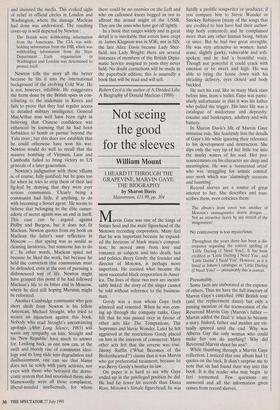Not seeing the good for the sleeves
William Mount
I HEARD IT THROUGH THE GRAPEVINE, MARVIN GAYE: THE BIOGRAPHY by Sharon Davis Mainstream, £11.99, pp. 304 Marvin Gaye was one of the kings of Sixties Soul and the male figurehead of the Motown recording corporation. Many feel that he was important because he expand- ed the horizons of black music's composi- tion; he moved away from love and romance as subjects and into death, lust and politics. Berry Gordy, the founder and director of Motown, is perhaps more important. He created what became the most successful black corporation in Amer- ica. The lives of these two men are inextri- cably linked: the story of the singer cannot be told without reference to the business- man.
Gordy was a man whom Gaye both admired and resented. When he was com- ing up through the company ranks, Gaye felt that he was passed over in favour of other acts like The Temptations, The Supremes and Stevie Wonder. Later he felt aggrieved at the restrictions Gordy placed on him in the interests of commerce. Many other acts felt that the reverse was true_ Jimmy Ruffin (`What Becomes of the Brokenhearted?') claims that it was Marvin who got preferential treatment, because he was Berry Gordy's brother-in-law.
On paper it is hard to see why Gaye ended up in the privileged position he did. He had far fewer hit records than Diana Ross, Motown's female figurehead; he was hardly a prolific songwriter or producer, if you compare him to Stevie Wonder or Smokey Robinson (many of the songs that are credited to him have had their author- ship hotly contested) and he complained more than any other human being, before or since. But he had two great strengths. He was very attractive to women: hand- some, slightly gawky, vulnerable and soft- spoken; and he had a beautiful voice. Though not powerful it could crack with emotion or be sweet and high. He was able to bring the house down with his pleading delivery, eyes closed and body buckled.
He met his end, like so many black stars before him, from a bullet. Gaye was partic- ularly unfortunate in that it was his father who pulled the trigger. His later life was a catalogue of misfortune and depravity: cocaine and bankruptcy, adultery and wife battery.
In Sharon Davis's life of Marvin Gaye minutiae rule. She fearlessly lists the details of Gaye's life while ignoring their relevance to his development and destruction. She dips only the very tip of her little toe into the murky waters of his soul. Her pro- nouncements on his character are deep and meaningless. He was a 'tormented artist' who was 'struggling for artistic control' over work which was 'alarmingly accurate and haunting'.
Record sleeves are a source of great interest to her. She describes and tran- scribes them, even criticises them:
The album's front cover was another of Motown's unimaginative sleeve designs. ... Not an attractive sleeve by any stretch of the imagination!
No controversy is too mysterious:
Throughout the years there has been a dis- crepancy regarding the correct spelling of `Little Darling (I Need You)'. It has been credited as 'Little Darling I Need You', and Little Darlin' I Need You'. However, as it is listed in Jobete's catalogue as 'Little Darling (I Need You)' — presumably this is correct.
Presumably.
Some facts are elaborated at the expense of others. Thus we have the full itinerary of Marvin Gaye's cancelled 1980 British tour (and the replacement dates) but only a passing mention of the transvestism of the Reverend Marvin Gay (Marvin's father Marvin added the final 'e' when he became a star). Indeed, father and mother are vir- tually ignored until the end, Why was Alberta Gay the only woman who could make her son do anything? Why did Reverend Marvin shoot his son?
While thumbing through a Marvin Gaye collection, I noticed that one album had 11 quotes on the back. It didn't surprise me to note that six had found their way into this book. It is the reader who may begin to feel tormented. Few questions are answered and all the information given comes from record sleeves.


















































 Previous page
Previous page